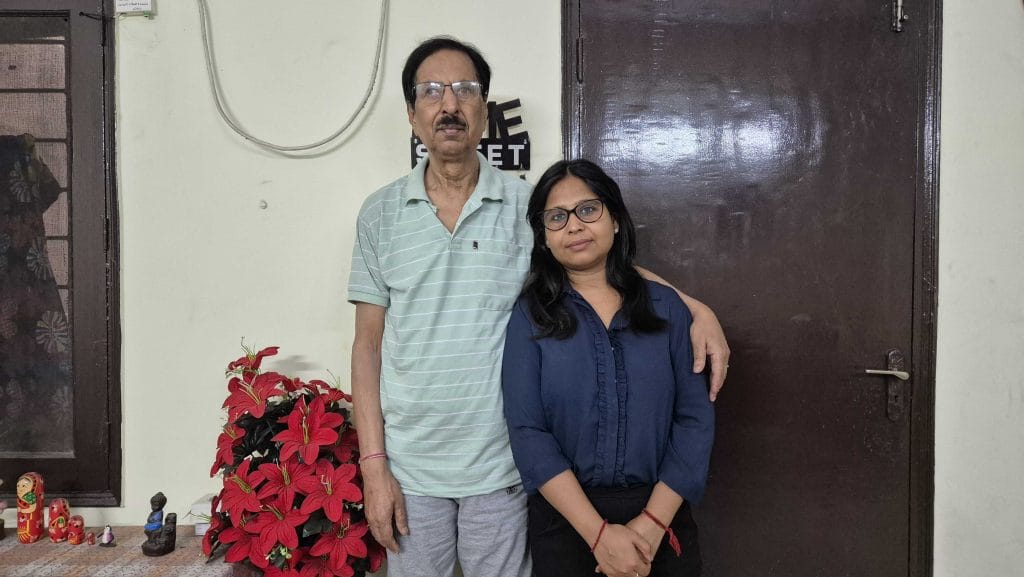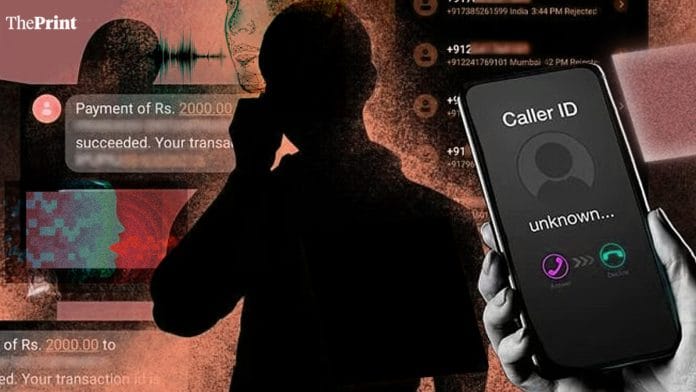New Delhi: Seventy-five-year-old Tapan Bhattacharya was reading his morning newspaper when an SMS alert upended his neatly planned life. A sum of Rs 5 lakh had been debited from his bank account in a transaction that he had not initiated. Soon, he realised that not five or ten lakh, but 20 lakh rupees had disappeared from his fixed deposits. Half his life savings had been wiped away. The rest of the morning was a blur.
“We are in dire straits after this scam. We have decided to postpone my wedding, which was scheduled for early June. I want to save what we have left to meet any potential hospital expenses,” said Bhattacharya’s daughter, Rakhi.
It’s a known fact that the elderly—many of whom have a savings corpus to help them navigate retirement—are among the most vulnerable to cybercrime. Everyone, from former Police DGPs to retired army brigadiers, has fallen victim to smooth-talking criminals on the other end of the phone or unwittingly clicked on ubiquitous links.
Now, civil society groups, NGOs and even police across India are stepping in to bridge the digital gap and create awareness among the seniors to protect them from cybercrime. Kolkata Police has launched the ‘stop, drop and inform’ awareness campaign against cyber fraud. Bengaluru Police, in collaboration with Nightingale Medical Trust, is conducting workshops on digital hygiene. And HelpAge India has launched Projects Saksham and Surakshit to provide digital literacy to seniors in rural and urban areas.
“The statistics about cyber criminals targeting the elderly are very, very high and extremely concerning. The measures to mitigate it are slower,” Sonali Sharma, head of communications at HelpAge India said.

The latest NCRB data from 2022 showed an 86 per cent increase in cybercrimes targeting the elderly from 2020. Delhi’s Intelligence Fusion and Strategic Office, which investigates crime exceeding Rs 50 lakh, said that in 45 out of 60 active cases of digital arrest, the elderly were targeted.
“The elderly are unaware, and in a lot of ways, innocent, while navigating through these things. They lose their life savings to cybercrime, which is their corpus to get by in the later years. It just vanishes at the click of a button due to a lack of awareness,” Sharma added.
Also read: Geriatric medicine is India’s new priority. Elderly were forgotten in Youngistan for 2 decades
Digital awareness workshops
Bengaluru Police and Nightingale Medical Trust’s helpline number 1090 has been buzzing with calls from senior citizens who want to attend workshops on digital literacy and cybersecurity. It’s only been a year since the campaign was launched, but the response has been surprisingly excellent.
“We urged all the callers to organise groups of people who wanted to attend such sessions and then conducted workshops,” said Sulekha K, a representative of NMT.
“For digital literacy, we have our own resource trainer, while a sub-inspector-level police official from Bengaluru Police conducts a workshop on cybercrime. The cops inform citizens on how to stay safe online, how to identify spam calls and fishy links,” said Ruth Nisha, who oversees the workshops.
NMT also approaches organisations associated with senior citizens, rotary clubs and residents’ welfare associations. The initiative started in June 2024, and 29 workshops have been conducted so far.
But everyone agreed that more needs to be done across the country.
Crores of rupees are being drained out of the accounts of elderly people in Bengaluru alone. In March, three senior citizens lost more than three crore rupees each to cybercrime within a span of ten days.
The 1090 helpline got six calls in one year by elderly people who complained of being held digitally captive, or being harassed by scam calls. The number is low, as there’s a separate number to report online scams.
“We usually just direct the elderly to the cyber police when such phone calls come in,” said Sulekha.
Qamar Ali, who doesn’t even use WhatsApp, was held digitally captive in October 2024 by scamsters posing as Mumbai Police personnel, who wanted a bribe from him to ‘release’ his son, who had been ‘caught’ for a serious crime.
For the love of his son, Ali complied and stayed on the phone for five hours with the scamsters, transferring Rs 5 lakh in the interim. They didn’t let him hang up the phone.
“I got a call from a person posing as a Mumbai Police constable who said two people have been charged with assaulting a woman, and that my son was there, but he hadn’t taken part in the assault. The cop promised to release my son for a bribe of Rs 1 lakh,” Ali said.
“I am not a modern person. I don’t understand these things (technology) and have no knowledge about them. I don’t even use UPI!” He said.
He ended up transferring Rs 5 lakh to the scamsters.
Ali didn’t even know the term ‘digital arrest’ before this. Delhi DFSO chief Hemant Kumar said the elderly are the most vulnerable to digital arrest scams.
“In large data analytics, we don’t see a large number of case burdens targeting the elderly, but we do so in the case of digital arrest. Seniors living without kids are generally targeted,” he said.
HelpAge India is also conducting mass digital literacy drives for the elderly across the country. Through its initiatives, the organisation claims to have reached out to 1.70 lakh seniors
“Our trainers not only take seniors through the curriculum covering various cybercrimes but also guide them on how to use the smartphone and resolve issues they’re facing with the phone,” Sharma added. “These are necessary because you cannot survive in today’s world without being able to navigate through digital spaces.”
Newspaper advertisements, IVR warnings about cybercrime, can all go unnoticed by the elderly, so such engaging workshops are extremely helpful for awareness generation.
From learning the basics of operating applications like WhatsApp, or drafting an email, the elderly also learn how to identify fraudulent calls and stay vigilant. HelpAge India shared anecdotes of their members successfully identifying fraudulent calls after receiving said training.
The NGOs inform the elderly of the kind of crimes and modus operandi of scammers. They warn them not to make investments online on the advice of a stranger, to never share OTPs, and to avoid digital arrests.
Jagdeesh Kumar Sharma, a 76-year-old from Rajasthan, dodged one such fraudulent call with the knowledge he had gained from HelpAge India workshops. A person with a photograph of his acquaintance but a separate number called him and demanded a loan of Rs 20,000, but Sharma knew better, and verified with his friend if he indeed needed money first.
“HelpAge India informed me of such frauds in detail, which helped me evade a fraudulent call,” Sharma says in a video on the organisation’s X page.
Also read: India’s seniors are facing abuse in families. Children are no longer Shravan Kumar
Losing faith in online banking
But sometimes, even awareness is not enough. Rakhi and her sister kept their father informed of possible cybercrimes such as OTP demands, phishing links, and investment scams. Bhattacharya, a retired banker himself, said his degree of awareness of such crimes is also high.
“I had applied for PNB’s credit card, meant for retired employees. I got a call from someone posing as a credit card agent, who wanted to get information from me, and wanted to get on a video call,” he said.
Rakhi was nearby when he picked up the call, and she warned him about the dangers of digital arrest. “I was alarmed when the fraudster told me he wouldn’t talk to me and simply wanted to talk to my dad,” she said.
In the police complaint, Bhattacharya mentioned getting multiple phishing links but is adamant that he didn’t click on any of them. “I don’t know how, without warning, they could get into my fixed deposits,” he said.
It’s rare for victims to actually get their money back. The National Cyber Crime Reporting Portal (NCRP) does not publish the recovery rate.
Two years ago, Mahrendra Prasad, a retired Government of India secretary, got a link from his son-in-law, warning that inability to pay a certain fee would lead to electricity being cut off from his house. Prasad, now 82, had no reason to doubt it, nor did his son-in-law. He lost Rs 2 lakh in that scam, but has since sworn off internet banking.
Cybersecurity fraud on elderly people also has cascading effects that take a toll on their health and quality of life, according to a report by Safer Internet India, a collective managed by Koan Advisory Group.
“Victims of online fraud face stress-related illnesses, cognitive decline, and higher healthcare costs. Fraud can trigger hypertension and weakened immunity, especially in senior citizens who may avoid treatment due to expenses. The emotional toll of fraud also causes fear, paranoia, and cognitive decline,” read the report.
What’s more, unlike working professionals, the elderly are later unable to bear healthcare costs. Such scams can also lead to tension within the family, as the financial burden of pension-dependent elderly falls on their children and relatives, wrote the authors of the study.
“A majority of seniors—71 per cent—depend on pensions or family transfers for financial sustenance. Fraud worsens their dependency, forcing working-age family members to reallocate resources and reducing disposable income. In low-income households, this strain can lead to deferred education, loan defaults, and compromised future savings,” the study went on to say.
The irony is that digital banking can be most beneficial for the elderly who lose mobility in the later stages of their lives, but increasing cybersecurity threats are dissuading them from going online.
Even a banker like Bhattacharya has lost all faith in the system.
“I always go to the bank branch physically if I need some work to be done, and use only my debit card and NEFT for some transactions. There is no mobile app for me,” Mahendra Prasad added.
This article is part of Grey World, a series on India’s senior communities. Read all articles here.
(Edited by Theres Sudeep)






